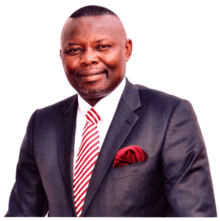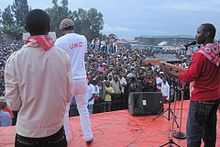Vital Kamerhe
| Vital Kamerhe | |
|---|---|
 Vital Kamerhe - December 2010 | |
| Born |
4 March 1959 Bukavu, Belgian Congo |
| Residence | Democratic Republic of Congo |
| Website | |
| http://www.vital-kamerhe.com/ | |
Vital Kamerhe (born 1959) is a Congolese politician. Former Speaker of the National Assembly of the Democratic Republic of the Congo and former Minister of Information, he is currently Honorary President of the National Assembly, founder and leader of the UNC party (Union pour la Nation Congolaise) and candidate to the 2011 presidential election in the DRC.
Biography
Early life and education
Born in Bukavu, Sud-Kivu, on March 4, 1959, Vital Kamerhe Lwa Kanyiginyi Nkingi[1][2] is the son of Constantine Kamerhe Kanyginyi and Alphonsine Mwa Nkingi. Originally from the Shi community of the Walungu territory, he is married and father of 9 children.
He began his primary school in Bukavu and then in Goma. He then continued in the Kasai-Oriental, in Gandajika, where he finishes his primary school. School years 1975-1976 and 1976–1977, he attended the Institut Sadisana (former College St. Francois-Xavier) in Kikwit Sacré-Coeur,Bandundu province. He then moved to Kananga (Kasai-Occidental Province) and finally, after one year, to Mbuji-Mayi where he obtained his State degree in 1980 (Institut Mulemba). This experience led him to learn all four national languages of Congo namely Kikongo, Lingala, Kiswahili and Tshiluba. He also speaks fluent French.[2]
From there he completed his studies at the University of Kinshasa, where he received his degree in Economics in 1987 with distinction. There he stayed as teaching assistant.[3]
Political career

Under Mobutu
Kamerhe started his political career in 1984 with the UDPS (Union pour la Démocratie et le Progrès Social). During the democratic transition under Mobutu, he was a member of the Rassemblement des forces Sociales et Federalistes (RSF) of Vincent de Paul Lunda Bululu and was also president of the Jeunesse de l'Union Sacrée de l'opposition Radicale et Alliés (JUSORAL), an opposition youth league. Between 1993 and 1995 he works in several public functions:
- 1993 : Director of the Cabinet of the Ministry of the Environment, Tourism and Directeur de Cabinet au Ministère de l’Environnement, Tourisme et Conservation de la Nature
- 1994 : Coordinator of the Prime Minister's Cabinet
- 1994-1995: Director of the Cabinet for the Minister of Higher Education and University, Mushobekwa Kalimba wa Katana, member of Lunda Bululu's RSF
There is some controversy over whether he was a member of a Mobutist youth league (Frojemo), led by General Etienne Nzimbi Ngbale Kongo wa Basa, a fact his opponent often use to discredit him.[4]
Under Kabila
Under Laurent Kabila, Kamerhe becomes the deputy chief of staff of Etienne-Richard Mbaya, the minister of reconstruction, then:
- From 1997 to 1998 : Director of the Service National (a quasi-military service set up by Laurent Kabila)
- In 1998 : Finance Counselor at the Ministère de la Défense Nationale et Anciens Combattants, with the general Denis Kalume
and finally deputy commissioner in charge of MONUC affairs.[4]
Role in the peace process of the Great Lakes region
A founding member of the PPRD party in 2002, Vital Kamerhe was one of the leading figures in the peace process in the Democratic Republic of Congo, he was even nicknamed "le Pacificateur", the "Peacemaker". As Commissioner General of the Government responsible for monitoring the peace process in the Great Lakes region he is one of the principal negotiators of the 2002 peace deal.[5] In 2003, he is appointed Minister of Press and Information in the transitional government.
Role in the 2006 General Election Campaign
In July 2004, he takes on the leadership of the PPRD and prepares Joseph Kabila's election campaign, which he receives a lot of credit for. He is elected as parliamentarian in Bukavu with one of the highest scores in the country and on December 29, 2006 he is elected president of the National Assembly.[4]
More Recent Developments
In 2009, as president of the National Assembly he questions the president Joseph Kabila and his own party over the Umoja Wetu operations that allowed several thousand Rwandan troops to deploy into the Congo without informing the parliament.[6] On January 21, 2009 he releases a statement to Radio Okapi expressing his disappointment[7] for the joint military operations between the Congolese and Rwandan army in the Kivu, conducted without informing the National Assembly and the Senate and thus violating the article 213 of the constitution.[8]
On March 25, 2009 he delivers a speech resigning as President of the National Assembly.[9][10] On December 14, 2010 Kamerhe officially quits the PPRD announcing his candidacy to the Presidential Elections of 2011 and the creation of his new party,[11] the UNC (Union pour la Nation Congolaise),[12] which is expected to have its official inauguration in February 2011.
References
- ↑ "CSIS - The Road to Presidential Elections in the Democratic Republic of the Congo - Feb 2, 2011" "The question of the name is part of a pseudo-political campaign aiming at depicting Vital Kamerhe as a "rwandaise", hence enemy of the congolese people. Vital Kamerhe himself speaks about this issue during the conference held at the CSIS, in Washington DC on February 2nd, 2011. The question and answer related to this topic can be heard starting at 00:56:26"
- ↑ 2.0 2.1 " Élogieux cursus de Vital Kamerhe, président l’Assemblée nationale ", January 10, 2007, copy on CongoForum.be
- ↑ "Radio Okapi (2006)"
- ↑ 4.0 4.1 4.2 "Fresh air in Congolese politics"
- ↑ "CNN - DR Congo peace deal signed - December 17, 2002", "accessed on 01/30/2011"
- ↑ "Call for DR Congo speaker to quit", AFP, 27 February 2009.
- ↑ "Kabila decision incensed Congolese", Sapa-AFP (IOL), 22 January 2009.
- ↑ "Constitution de la République Démocratique du Congo"
- ↑ "LAVDC Radio - Jeudi 26 mars 2009"
- ↑ "Congolese assembly speaker quits". BBC. 25 March 2009. Retrieved 2011-01-29.
- ↑ "DECLARATION POLITIQUE DE L’HONORABLE VITAL KAMERHE, PRESIDENT NATIONAL DE L’UNION POUR LA NATION CONGOLAISE, UNC, en sigle (Kinshasa, Mardi 14 décembre 2010)"
- ↑ "UNC Party Flyer - released on December 14, 2010"
| |||||